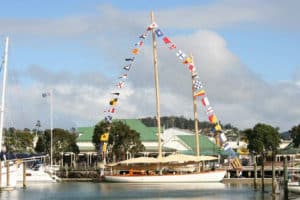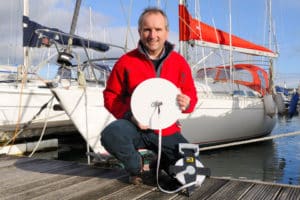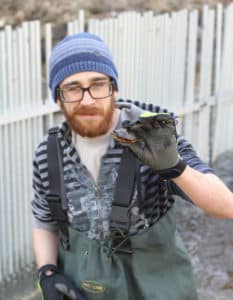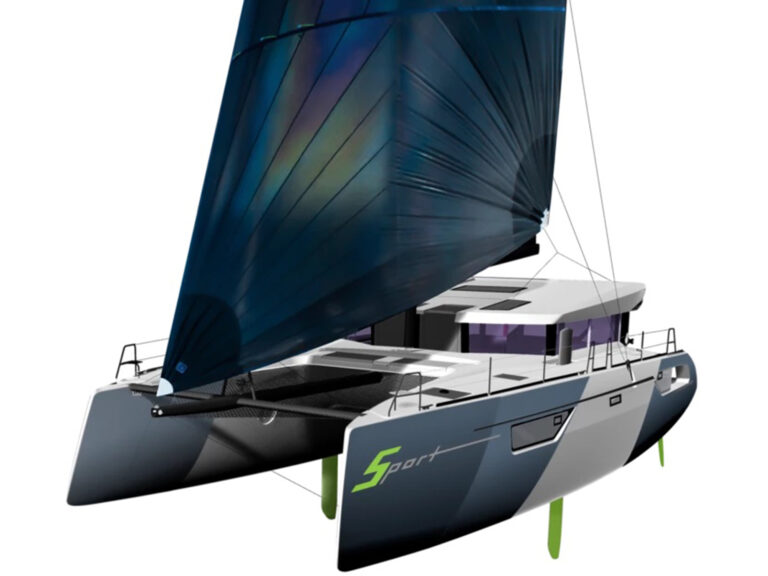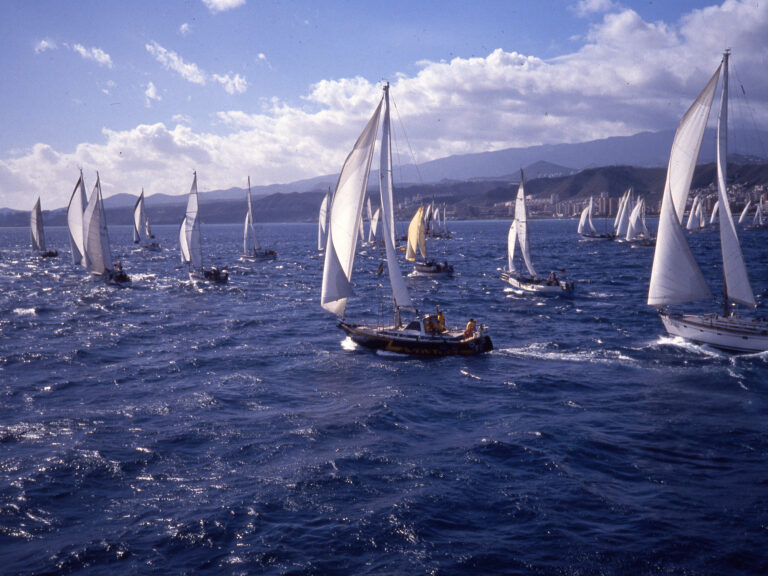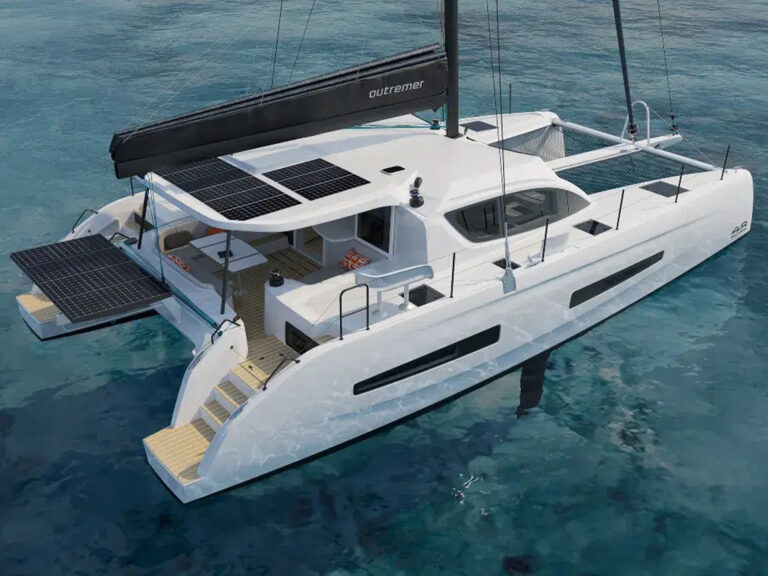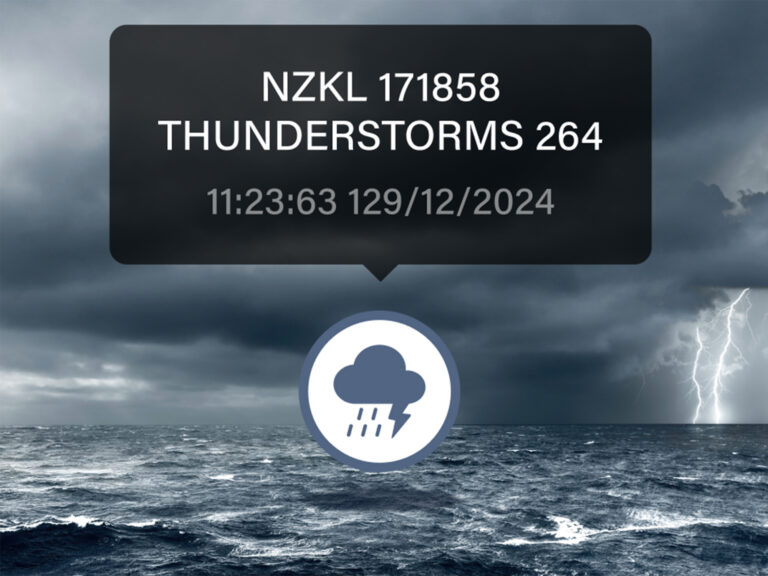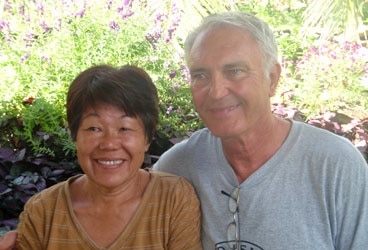
man on a mission 368
I first met Jim and Kyoko Bandy in the Galápagos Islands 10 years ago. They were sailing on their beautiful Passport Yacht, Also II, accompanied by a handsome black-and-white cat named Mr. Tuxedo.
Unlike most cruising sailors, who find even the Mexican concept of mañana too urgent, Jim and Kyoko both had quite specific plans for their future and a notable determination to achieve them.
In fact, in mid-conversation she said, “Excuse me, I’m going fishing now.”
She met Jim through a personals ad she posted in a San Francisco newspaper. She didn’t ask for “a fun-loving, compassionate man who’s unafraid of commitment and who likes to walk in the rain,” but simply for a man who’d promise to take her fishing.
Jim promised, and with a well-founded yacht and plans to cruise extensively, he was confident he could deliver. A handsome ex-racecar driver from Oklahoma and an old-fashioned gentleman, Jim would strike anyone as a typical patriotic hometown hero. But he’d somehow become completely disillusioned with his homeland, and he was leaving the American shores behind without a glance backwards.
He confided to me that he planned to sail to Tonga and convince the king that he should give Jim an island of his own where he could live out all his many utopian philosophies without interference. It was an uncomfortable moment, for I’ll confess that I feared his disillusion was bordering on delusion. Nevertheless, I wished the couple well on their quest.
We kept in sporadic touch through the SSB-radio net Jim founded and anchored, known as The Rag of the Air. Each morning, seven days a week, Jim tunes up his radio to 8173 megahertz and keeps tabs on the whereabouts and welfare of a long list of yachts cruising on the waters of the South Pacific. Through tireless volunteer effort, he analyses and dispenses essential weather information, helps in search-and-rescue efforts, and provides a radio meeting place for friends dispersed across the vast island area.
Diana and I sailed south to New Zealand, turned off our radio, and lost track of Jim and Kyoko. But three years later, through friends who participated in The Rag of the Air, we learned, incredibly, that a chief-not in Tonga, but in Fiji-had given Jim an island, in a remote region of Vanua Levu, in the northern part of that country. Jim was rumored to be setting up businesses for the benefit of the local people, and Kyoko was reported to be in seventh heaven, fishing out on the third-longest reef in the world. I shook my head and reminded myself to never underestimate the power of a dream clearly defined.
This year, as Diana and I approached Samoa, I broke my usual radio silence and called in to The Rag, as it’s known. I confess that I’m what regular participants call a lurker, one who eavesdrops on the net but doesn’t actively call in. Jim admonished me for my dastardly radio crimes, but then, to soften the return of the prodigal son, he called me “a two-bit piece of worn-out shoe leather.” I was later to learn that only his closest friends earn this high acclaim.
I promised that we’d find Also Island wherever it was and come to visit him. As it turns out, this was no easy task as it lies many miles to windward from our check-in port of Savusavu.
I suppose I expected to find two skinny, mosquito-bitten idealists huddled under a lean-to while scratching out a meager living from an unforgiving bush. Instead, we found a thriving little compound complete with workshops, electrical generators, running water, a cookhouse, radio antennas, tourist accommodations, and a comfortable home perched above it all for Jim and Kyoko.
Forget tropical torpor; Also Island buzzes with a staff of 20 building and repairing boats, operating a small dry-goods store that serves the surrounding three villages, and running a scheduled boat transport to the distant regional capital of Labasa. There are several more ambitious projects in the works, such as a copra press to create a local cash crop out of the multitude of coconut trees, a biodiesel plant to create an affordable and self-sufficient supply of fuel, and an ice plant that will allow Jim and Kyoko to buy and keep fresh the fish caught locally. Under construction was a large catamaran transport boat to haul those fish, locally grown vegetables, and the local population safely to market. The grounds are beautifully landscaped, and the large garden is lush and prolific.
Mr. Tuxedo, now a stately old gentleman, lords over what is clearly the economic epicenter of the region.
It wasn’t only their entrepreneurial energy that impressed me; their humanitarian efforts did, too. Jim and Kyoko sailed into the seldom-visited bay nine years ago and fell in love with the poor but friendly local people. Jim, an ace mechanic, at first dedicated himself to fixing the village supply boat that had been broken down for three years. He repaired all the broken outboards the locals had come to rely on for fishing and transport. But he soon realized his efforts would be for naught if the locals themselves didn’t learn to maintain their own equipment, so he started a formal training program. Seeing that the village had no reliable source of supplies, they loaned money to a local couple, trained them in simple accounting, and helped start a village store. They then started sponsoring promising young students longing for a higher education.
As cruising yachts heard of Jim’s hideaway and began to visit, Jim cajoled them to join in his philanthropic efforts and donate supplies to the local school, sponsor a student, or contribute in some way to the lives of the people less fortunate than themselves.
Finally, confident in Jim and Kyoko’s overall good intentions, the local chief granted them a 75-year lease on seven acres of Qaraicikobia Island, near the village of Cawaro. Here they could securely invest their time and retirement money into a private concern that, perhaps one day, would become economically self-sufficient, act as a working example for locals with business aspirations, and provide up-until-now missing essential services for the surrounding villages.
This experiment hasn’t been without its setbacks, frustrations, cultural misunderstandings, and heartbreaks. Last year, they lost their beloved Also II in Hurricane Thomas. But through patience, determination, and gargantuan effort, Jim and Kyoko have held on. They’ve won the hearts and confidence of hundreds of local people who share in their vision of providing the community with employment, training, and innumerable tangent opportunities.
Under an open roof, Jim has constructed what he calls The Deck of Knowledge. This is a café of sorts where he hopes that visiting yachtsmen will enjoy local foods, sip a cold beer or try a cup of the ubiquitous kava, meet local people, and exchange knowledge and philosophies. Jim feels that the sailing community by and large is full of extremely talented and interesting people, and he longs to create an environment that lures a critical mass of these accomplished sailors north for their enjoyment and for the benefit of the local people.
It’s a grand vision, one that espoused by anyone other than Jim Bandy and his wife, Kyoko, would seem naïve, unrealistic, and unlikely to come to fruition. But when it comes to this man on a mission, I’ve learned my lesson. I plan to sail back to Also Island one day, which by then will probably have become Also Archipelago, to witness their economic juggernaut and perhaps even contribute to The Deck of Knowledge.

